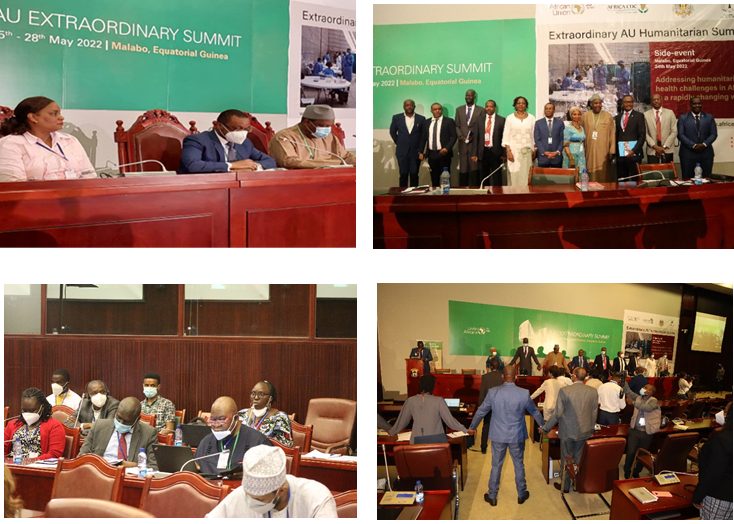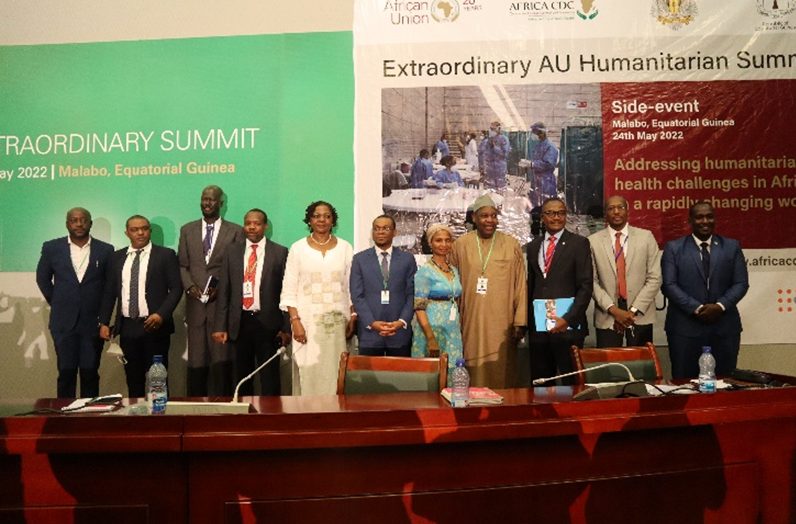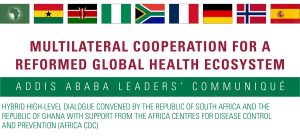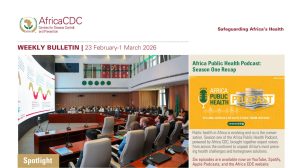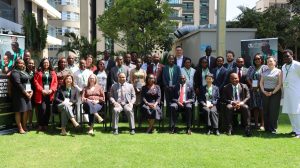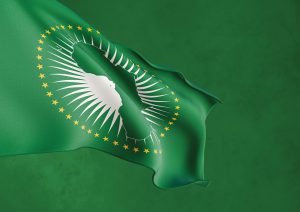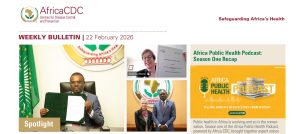On 25th May 2022, in Malabo, Equatorial Guinea, the Africa Centres for Disease Control and Prevention (Africa CDC), the Government of the Republic of South Sudan, the Government of the Equatorial Guinea, the Government of the Democratic Republic of Congo, the World Health Organization (WHO), the United Nations International Children’s Emergency Fund (UNICEF), the United Nations Population Funds (UNFPA), the Joint United Nations Programme on HIV/AIDS (UNAIDS) and the United Nations Office for the Coordination of Humanitarian Affairs (OCHA) in solidarity called for all Member States, partners and stakeholders to apply the innovative solutions to address the humanitarian health challenges in Africa in a rapidly changing world during an event held on the margins of the Africa Union Extraordinary Humanitarian summit.
Reading the call to action on behalf of the aforementioned Member States and Agencies, Mr. Howard Nyika, technical Officer, Africa CDC, “Applauded the Heads of African Union (AU) Member State governments commitment in addressing humanitarian health challenges in the past.
Called all Heads of State to redouble commitments as investments, prioritize, and dedicate domestic resources and recurrent spending as an integral part of national and regional peace and security, and a pre-requisite for attainment of the AU Agenda 2063.
Called upon AU Member States, regional and global organizations to support the African Humanitarian Agency (AHA) and follow through on political and funding commitments towards addressing the causes of expanding fragility indexes on the continent including Climate Change, violent conflict, poverty, food insecurity and political instability.
Recommended AU Heads of State and Government to appoint a national high-level humanitarian coordinator with authority and political accountability to lead whole-of-government and whole-of-society approaches, prioritizing community involvement and localization of humanitarian action.
Advocated for AU Member States to uphold the rules under International Humanitarian Law, particularly during armed conflicts, to ensure protection for those not involved in hostilities. This includes access to health service locations, provision of a minimum package of health services, protection of healthcare personnel and provision of impartial care to most vulnerable including women and children in humanitarian settings.
Advocated for AU Member States, regional and global organizations to empower Community Health systems as the first line of defence and linking to local health authorities and investment and strengthening of local humanitarian institutions.
Advocated for development and adoption of policies that are inclusive, timely responses to save lives and address the health needs of refugees and migrants including a designated policy guideline on HIV/AIDS intervention in humanitarian setting to ensure African Union’s vision of ending HIV/AIDS as public health emergency by the year 2030.”
The side event which was moderated by Hon. Mitoha Ondo, Vice Minister of Health and Social Welfare of Equatorial Guinea, purposed to raise awareness on the growing inequalities, vulnerabilities and unstable access to healthcare including impact of COVID-19 in fragile context and to discuss the innovative solutions to existing and newly emerging humanitarian health challenges in Africa that culminated in a call for coordinated investment and action.
The world bank estimates that by 2030 at least half of the world’s poor people will be living in fragile, and conflict-affected settings. In addition, in Africa, more than half of all refugees are children and adolescents below the age of 18, requiring stronger emphasis on their needs and well-being including education and life-skills, livelihoods, and sexual and reproductive health and gender-based violence protection and response.
Opening the side event, Dr Margaret Agama-Anyetei, the Ag. Director of Health, Humanitarian Affairs and Social Development (HHS), African Union (AU) highlighted the importance of availability of quality data and evidence generation, investments, partnerships, accountability and creation of enabling environment. Whilst, Dr Ki-Zerbo, Director and Head of WHO Liaison Office to the AU and UNECA, emphasized the need for One-health (human-animal-environment) interface, stakeholder involvement for better health governance at all levels, evidence based innovative approaches and solutions, cross-border collaboration in health, and maintaining social protection to health related and broader Sustainable Development Goals (SDGs) gains.
During the round table discussions, Dr Gabriel Loi, Director General Ministry of Health, Republic of South Sudan, Dr Landry Tsague, Senior Health Adviser, UNICEF and Dr Fabian Ndenzako, WHO presentative a.i to South Sudan raised the issues of chronical weak health systems especially for workforce, infrastructure and financing; negative impact of COVID-19 on the health and wellbeing of children brought about by the disruption of routine immunization and the significantly worse health indicators in Fragile and Conflict-affected and vulnerable countries (FCV) of which African is home to at least thirteen (13) countries as per the World Bank Group report. Strongly, the representative from the Democratic Republic of Congo and special adviser for strategy and planning, highlighted recurrent crises and conflict situations, multiple outbreaks of infectious diseases including Ebola Virus Disease (EVD) and COVID-19 and called for the establishment and operationalization of a regional and subregional health emergency intervention workforce and structure.
To think on the new and durable solutions to address the humanitarian health challenges, Ms. Argentina Matavel Piccin, UNFPA Regional Director for West and Central Africa, called for member states to take into account in-house solutions and increase manufacturing investments to avail needed products and supplies. Dr. Kirzebo from WHO, advocated for establishment of a robust procurement and medical countermeasures network, health financing solutions, and innovation expansion with focus on access to regional and global distribution platforms, as well as intellectual property rights. The Director and Head of UNAIDS Liaison Office to the AU and UNECA, Dr Sihaka Tsemo, powerfully called for more focused efforts to address Sexual Gender Based Violence in line with the new AU Public health order and by putting people at the center. To empower Member States to address holistically the health challenges, Mr. Howard Nyika, Africa CDC, underscored the critical need to expand the role of National Public Health Institutes (NPHIs) in improving the capacities and capabilities for prevention, preparedness, response and recovery to pandemics and other public health emergencies in the humanitarian settings. Finally, Mr. Modibu Traore, the Head of OCHA office in Niger, underlined the essence of coordination, equating it to leadership in humanitarian emergencies.
Indeed, the event was successful in bringing Member states and partners to a round table to discuss and reach consensus on the workable and durable solutions to address humanitarian health challenges as well as elevated the motivation and commitment towards greater investments and improved coordination, as a step towards realization of the AU Agenda 2063, recalled Neema Kamara, the coordinator of the side event from Africa CDC and Christine Akunaye, Liaison officer from AU.
The side event was organized by Africa CDC, WHO, UNICEF, UNFPA, UNAIDS and the Government of South Sudan in order to augment efforts set forth by African leaders to address the current humanitarian challenges that the continent is facing and in support of the establishment and operationalization of African Humanitarian Agency (AHA). Africa CDC pledges to support and work with the AHA to alleviate the health challenges in the humanitarian context in Africa.
